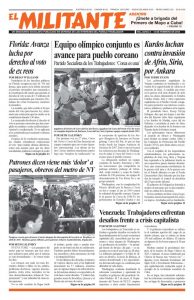Supporters of political rights in Florida have gathered more than 766,000 signatures to put an amendment to the state constitution granting voting rights to over 1.5 million people who had been convicted of felonies on the ballot this November. Floridians for a Fair Democracy, a voting rights group, spearheaded the effort.
The measure, which has to get 60 percent of the vote to become law, would eliminate a restriction that has been part of Florida’s constitution for 150 years.
The amendment would restore voting rights to former felons once they complete their prison terms, parole and probation. It wouldn’t apply to those convicted of murder or sexual offenses.
After the American Revolution, states expanded voting restrictions “to include felony offenses as a way for wealthy elites to constrict the political power of the working classes,” the Miami Herald wrote in a 2016 article by Mary Ellen Klas, titled “Florida Leads Nation in Disenfranchising Former Felons.”
“After the Civil War, several southern states, including Florida, used the disenfranchisement laws to block black males from voting,” Klas wrote.

Florida’s law bars more than 10 percent of its overall adult population from being able to vote, including 23 percent of African-Americans. According to the Sentencing Project, three-quarters of former felons in Florida are Caucasian.
After workers behind bars get out of prison, they have to wait at least five years before they can apply to Florida’s Office of Executive Clemency to get their voting rights back. It takes years before petitions are heard.
Between 2011 and 2015 only 2,000 such requests were granted. Another 10,463 women and men are on a growing waiting list. At the same time, the number of disenfranchised convicted felons living in Florida increased by almost 150,000 to over 1.6 million. Nationwide similar laws prohibit more than 6 million people from voting.
To apply for a clemency grant, you submit the court documents from everything you were ever convicted of anywhere, give references and answer a list of questions, including details about your family, income, drinking habits and work history. People have been rejected for having parking tickets. If your application is approved, then you have to appear before the clemency board — the governor and cabinet members — which meets just four times a year.
Roderick Kemp of Fort Lauderdale, was one of the few who received clemency after his case was featured on a Florida Center for Investigative Reporting documentary last year. Kemp had been informed in 2016 that his voting rights were being revoked because of a felony conviction for possession of cocaine 30 years earlier.
The successful drive to put the constitutional amendment on the ballot highlights the growing opposition to this long-standing violation of basic democratic rights.
“Robert A. McDuffie stood outside the Charlotte County Administration Center for months asking residents to help him regain a right he lost a decade ago,” said a Jan. 28 Charlotte Sunarticle by Andrea Praegitzer. Together with his wife Jennifer, “they estimate they got thousands of signatures.”
“Most people who can vote will support the Voting Restoration Amendment,” McDuffie told Praegitzer. He said it’s a matter of people’s rights and dignity.

